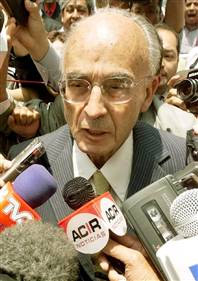 |
 |
 |
 Editorials | Opinions | March 2005 Editorials | Opinions | March 2005  
Mexico Stubbornly Denies Its Dark Past
 Denise Dresser - LA Times Denise Dresser - LA Times

While many countries seek to uncover the truth about their history, Mexico seems intent on burying it.
 
| Former President Luis Echeverria (Photo: Daniel Aguilar / Reuters)

|
Although more than 20 countries have established effective mechanisms for dealing with their troubled pasts, Mexico’s isn’t working. Rwanda and Kosovo and Chile have recognized the criminal behavior of their former leaders, but Mexico isn’t prepared to do so. Argentina is jailing former generals, and Mexico still can’t. Today, Mexico faces the real possibility of obligatory amnesia.

The mandate of the office of the special prosecutor on “crimes of the past” — created by President Vicente Fox — was to discover and reveal past abuses; to determine personal and institutional responsibility; to systematize and disseminate the truth about Mexico’s dirty war in the 1960s and ’70s, when hundreds of leftists “disappeared.” But time and again, the special prosecutor’s office has tripped over the same stone: A political and legal system that pays lip service to truth but isn’t committed to revealing it. Mexico’s political elite still believes that truth is a concession; something that can be doled out in small portions in order to keep the victims and their families at bay.

A recent ruling of Mexico’s Supreme Court — that it was too late to bring a former president to trial — is just another example of a legal labyrinth with few exits. In Mexico, domestic laws still trump international treaties. Although many nations have surrendered their sovereignty to international norms on human rights, Mexico has not.

So, because he had no other choice, the special prosecutor resorted to the charge of “genocide” against former President Luis Echeverria in the 1971 killings of student protesters. The prosecutor believed that perhaps crimes against humanity might be punished even if murder committed long ago could not. But the court ruled the Mexican Constitution establishes a 30-year statute of limitations that not even international treaties on genocide can void.

This blow to the quest for truth reveals what lies at the heart of the matter. Fox may not want crimes of the past to be punished or a former president to be imprisoned for them. Fox may say that he is committed to justice, but he would actually prefer that it not take place. | 
 | |
 |



